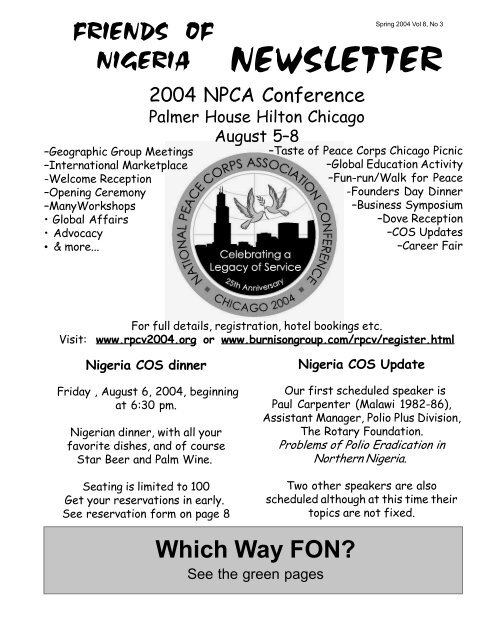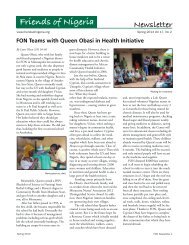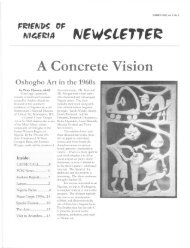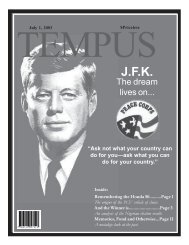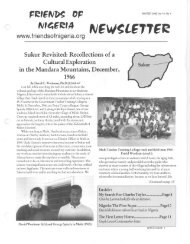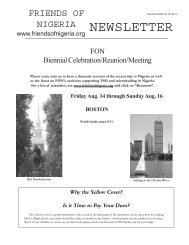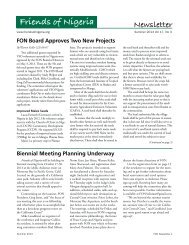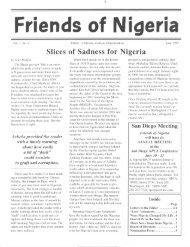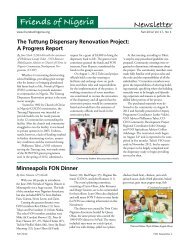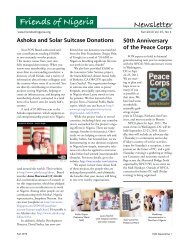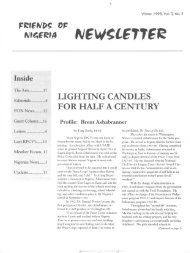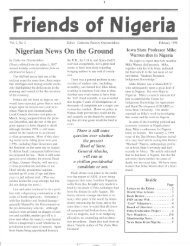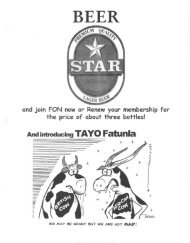NEWSLETTER - Friends of Nigeria
NEWSLETTER - Friends of Nigeria
NEWSLETTER - Friends of Nigeria
Create successful ePaper yourself
Turn your PDF publications into a flip-book with our unique Google optimized e-Paper software.
FRIENDS OFNIGERIA–Geographic Group Meetings–International Marketplace-Welcome Reception–Opening Ceremony–ManyWorkshops• Global Affairs• Advocacy• & more...Spring 2004 Vol 8, No 3<strong>NEWSLETTER</strong>2004 NPCA ConferencePalmer House Hilton ChicagoAugust 5–8–Taste <strong>of</strong> Peace Corps Chicago Picnic–Global Education Activity–Fun-run/Walk for Peace-Founders Day Dinner–Business Symposium–Dove Reception–COS Updates–Career FairFor full details, registration, hotel bookings etc.Visit: www.rpcv2004.org or www.burnisongroup.com/rpcv/register.html<strong>Nigeria</strong> COS dinnerFriday , August 6, 2004, beginningat 6:30 pm.<strong>Nigeria</strong>n dinner, with all yourfavorite dishes, and <strong>of</strong> courseStar Beer and Palm Wine.Seating is limited to 100Get your reservations in early.See reservation form on page 8<strong>Nigeria</strong> COS UpdateOur first scheduled speaker isPaul Carpenter (Malawi 1982-86),Assistant Manager, Polio Plus Division,The Rotary Foundation.Problems <strong>of</strong> Polio Eradication inNorthern <strong>Nigeria</strong>.Two other speakers are alsoscheduled although at this time theirtopics are not fixed.Which Way FON?See the green pagesFALL 2002 1
FRIENDS OF NIGERIA<strong>NEWSLETTER</strong>Quarterly publication <strong>of</strong><strong>Friends</strong> <strong>of</strong> <strong>Nigeria</strong>, Inc.affiliate <strong>of</strong> theNational Peace Corps AssociationEditorAndy Philpotawphilpot@mountaincable.net<strong>Nigeria</strong> News EditorVirginia DeLanceyv-delancey@northwestern.eduBook EditorDavid Straindestrain@pacbell.netUpdate EditorDave Sugarmanilwacoboy@comcast.netProduction StaffNatoma (Nash) Noblenoblenn@millsaps.eduEarl (Buzz) Welkermysk3@aol.comGregory Zellgregzell@mindspring.comPeter J. Hansenpjhansen@ia.netPrinterLeesburg Printing CompanyLeesburg, FloridaBOARD OF DIRECTORSPresidentGregory Zellgregzell@mindspring.comVice PresidentFrieda Fairburnfrieda@madbbs.comMembership ChairPeter J. Hansenpjhansen@ia.netSecretaryKen Saleksale@aol.comLucinda Boydcindarboyd@mindspring.comVirginia DeLanceyvdelancey@northwestern.eduMike Goodkindmgoodkind@earthlink.netBob Peritorperito@aol.comAndy Philpotawphilpot@mountaincable.netDavid Straindestrain@pacbell.netDave Sugarmanilwacoboy@comcast.netfriends<strong>of</strong>nigeria.orgWebsite ManagerGreg JonesWebsite Newsletter ManagerCLeigh Purvis Gerber2 FON <strong>NEWSLETTER</strong>Letters to the EditorCan you help?I am Patricia (nee Ukoli) Ogedengbe a librarian <strong>of</strong> Africana atNorthwestern University, Evanston, Illinois. I am attempting tolocate Madam McReynolds, who taught me at Marymount College, aCatholic girls high school, Agbor, (about 40 miles from Asaba) in1961. I do not remember her first name because we did not refer toour teachers by first names then. I think she taught us literature, and was our music director so tospeak. She taught us many Negro spirituals, and American folk songs. We even staged the playHiawatha under her direction. She is a beautiful and imposing woman with a deep, “huge” andsweet voice. I sang some solos in Hiawatha because she believed that I had a good voice too. She alsogave us hints on self development. How to sit up straight, to care for our nails etc. I wish I can seeher again.•I thank you very much. Regards.Dr. Patricia Ogedengbe, Librarian <strong>of</strong> Africana, Northwestern UniversityMelville J. Herskovits Library <strong>of</strong> African Studies, Evanston, IL 60208-2300Thinking About going back?Dear FON,Paul Willis (25) 66–69 is my neighbor, living only 2 miles distant. It was through his desire torevisit his friends in <strong>Nigeria</strong>, in 1994, that he invited me to accompany him. He found all but 3buds, which was amazing to me after such a long time. The grapevine in <strong>Nigeria</strong> is very alive andwell. They were so pleased and accommodating and generous to the both <strong>of</strong> us, I was influenced toreturn by myself in 1997. They have welcomed me back, warmly, a total <strong>of</strong> 9 times now. Mybenefactor there, Olu Shaba, has always greased the skids thru immigration for me, whichencouraged me to return. He is a dear friend, and now comes to visit me in the U.S.A., twice a year,warm season only! I owe him a heap <strong>of</strong> gratitude. He bunks me in his guest house when Iarrive, with a cook and housekeeper, “Man, what a life!”I would encourage anyone wishing to return, to do so. The extortion at immigration has beeneliminated, so it is no longer necessary to arrange an escort through customs. You may be selectedfor scrutiny, but it is no different than foreigners entering this country.Corruption is rampant throughout the country, but does not involve foreigners, unless youwant to buy something, anything, then expect the quoted price to be inflated to the 4th power. Theaverage citizen is fortunate to find any type <strong>of</strong> employment, with an average annual income <strong>of</strong>$428.00. This lack <strong>of</strong> earningpower leads to the desperateattempts to extract extra cashfrom inexperienced foreigners.They also have a healthy dose<strong>of</strong> greed. I estimateunemployment is upwards <strong>of</strong>50%, which now has emergedin armed robberies on the roadsat night. There have also beenpolitical assassinations <strong>of</strong> late.Only time will tell if publicresolve for better conditions willeventually bring improvements.I pray for this to happen, as thepeople are pleasant, and deservemuch better conditions. It is anenjoyable climate, with all fruitsand vegetables available.•The unsuspecting traveler,Dennis Pals.L to R, back row; Abba, Dennis Pals, Hauwa (Eddy’s wife), Gadafi.Front row; Amir, Amina, Hannatu, Sardina.This photo was taken in January, 2004 at the Kano home <strong>of</strong>Abdullahi Eddy Tomasiewicz (25) 66–67.Photo: Ralph Proctor Museum, Pittsburgh
<strong>Nigeria</strong>n art travels from Kaduna to Minneapolisbut not without some problems.By Julie SwensonDuring my month long stint as a USAID volunteer in theFarmer-to-Farmer program in Kaduna, <strong>Nigeria</strong> I met RoseObadaki, a hotel manager by day and aspiring art dealer by night.She took me to her makeshift gallery, hidden in a resort cottage ona small man-made lake on the outskirts <strong>of</strong> town. It was quite aride getting there from central Kaduna. As a friend <strong>of</strong> <strong>Nigeria</strong> youknow just what I mean. The art was worth the trip. One afteranother, Rose pulled out beautiful work.As soon as I was over my jet lag, I called the Frank StoneGallery in Minneapolis. It’s owned by Lynn Olson (10) 64–66 andher husband, Frank Stone. Lynn was a Peace Corps volunteer in<strong>Nigeria</strong>, which made it easy to convince her <strong>of</strong> the great work Rosehad for us to show in Minneapolis.With several months to plan a visit, Rose and I planned forherself and two <strong>Nigeria</strong>n artists to come to the opening party atthe gallery in Minneapolis.Rose tried in vain for months to get a visa to come to theopening. Lynn and I wrote letters <strong>of</strong> invitation. An anxious internspent two days at the fax machine trying to get a fax to go throughto Rose and the embassy. Next we spent a small fortune and sentletters over via FedEx. Rose traveled to meetings in Abuja. I calledevery Republican I ever dated. A very anxious intern was on thephone for hours. It was all to no avail. The best answer we gotwas, “Check back in a few months.”By the time we had to give up on getting the artists here, I hadalready sent out dozens <strong>of</strong> press releases and about 3,000postcards inviting the world to come meet the artists and see thework. Many <strong>of</strong> the local arts calendars had already printedinformation on the show and the artists who now weren’tcoming. We decided the show must go on and that Rose wouldjust ship the work to Minneapolis.Rose and her Dad built a crate, packed it full <strong>of</strong> paintings anddrawings and went to drop it <strong>of</strong>f at the Kaduna FedEx <strong>of</strong>ficewhere they told Rose to call London to set up a pick up. After aweek <strong>of</strong> constantly talking to FedEx operators around the world,we found out that there isn’t an <strong>of</strong>ficial FedEx <strong>of</strong>fice in Kaduna.Someone got their hands on a sign and created a FedEx <strong>of</strong>fice thatwas closed down the next week when Rose stopped by.Theodore Miller (21) 66–68 1940–2003Rose and her Dadwent to DHL andshipped the crate <strong>of</strong> artstraight away. The cratesat in the Kaduna DHL<strong>of</strong>fice for a week. Then itdisappeared. Theanxious, now angryintern spent three fulldays on the phone withDHL trying to find it.The paintingseventually made it toLondon just in time for abomb scare and airlinestrike, all in the same day.This also happened to bethe day we weresupposed to hang thepaintings in the gallery. It Fulani Women by Abiola Odyne.was one day before theopening reception and we had no artists and no paintings to show<strong>of</strong>f.We hung photos I took in Kaduna and had the party. Thenight was a huge success, we had well over two hundred peoplecome and not one <strong>of</strong> them said, “Where’s the art? “The next day, the intern got a call from DHL. The crate was inWisconsin on its way to Minneapolis. We’d have paintings in timefor the second week <strong>of</strong> the show. A great excuse to alert the mediaand have another party!The paintings started selling immediately. Every day the gallerywas open, we sold at least one piece, usually more. In the artworld, that’s selling like hotcakes.The paintings are still available through the Frank StoneGallery at 612-617-9965 www.frankstonegallery.com. To see them,just call the Gallery or email me at julie@abbaspr.com , and we’llemail you scans or better yet, show them to you in person inMinneapolis.•Theodore L. (Ted) Miller, a research scientist with the BattelleMemorial Institute, died on June 11, 2003.Miller spent three years with the U.S. Air Force beforereceiving his B.S., Chemistry from Concord College in 1966. AtConcord, he was a member <strong>of</strong> the Blue Key National HonorFraternity, Science Club and American Chemical Society andreceived a varsity letter in football and basketball. He also enjoyedswimming and camping and had interests in electronics andcarpentry.He joined the Peace Corps in 1968 and taught math andchemistry at Egbado College in Ilaro. He was one <strong>of</strong> the “lost”<strong>Nigeria</strong> PCVs.A native <strong>of</strong> Crab Orchard, W.Va., Miller earned graduatedegrees from Marshall University, Huntington, W.Va., and theUniversity <strong>of</strong> Cincinnati.He taught chemistry at Ohio Wesleyan University, Delaware,Ohio, for 17 years before joining Battelle.In addition to his academeic achievements Miller also workedfor Habitat for Humanity across the U.S. and in the DominicanRepublic.Miller is survived by his wife, Mariellen; two children; twostep-children; and four grandchildren.Sources: <strong>Nigeria</strong> 21 training manual and Chemistry & EngineeringNews (Volume 82, Number 9, March 1, 2004)•SPRING 2004 3
<strong>Nigeria</strong> NewsEdited by Virginia DeLancey (04) 62–64PDP Wins in Local Elections<strong>Nigeria</strong>’s ruling People’s DemocraticParty (PDP) won a sweeping victory in localelections held March 27. The PDP won 25<strong>of</strong> the 30 states where elections were held,but lost in the key Muslim states <strong>of</strong> Kano,Zamfara, and Sokoto. It now controlsalmost all levels <strong>of</strong> governmentthroughout the country. The election wasmarred by a low turnout and claims <strong>of</strong>massive rigging. Elections were not held inthree local authorities due to lack <strong>of</strong> ballotpapers, and many <strong>Nigeria</strong>ns declined toparticipate in the voting saying they felt thattheir votes would not count as the electionwas “pre-determined”.A leading human rights group, HumanRights Watch, had urged the governmentto prevent politically motivatedassassinations linked to the election andappealed to <strong>Nigeria</strong>’s foreign partners,including the UK and the US, to insist thatthe government end impunity for politicalviolence. Earlier in the month, gunmenkilled the head <strong>of</strong> the electoral commissionin the central state <strong>of</strong> Kogi.About 250,000 police <strong>of</strong>ficers weredeployed throughout <strong>Nigeria</strong> ahead <strong>of</strong> thepolls to prevent fighting. In Kano, policefired warning shots when a mob outside apolling station tried to attack anopposition dignitary, and two electioncandidates died in the run up to the poll.However, there was little <strong>of</strong> the predictedviolence which had put the army onstandby. (Sources: BBC News, 3/25/04, 3/27/04, 3/29/04).Two Americans Killed inArmed AmbushTwo Americans were killed in an armedambush as they traveled by boat along theBenin River west <strong>of</strong> Warri. The Americansworked for a company contracted toChevron Texaco. Although kidnappingsand ambushes are common in the Delta, aspokesman for Chevron Texaco said thathe could not recall another incident inwhich expatriate workers were killed.Among the nine on board the boat, sevenwere killed, including the two Americans,and two other workers, and three navalpersonnel. Only one Chevron Texaco4 FON <strong>NEWSLETTER</strong>employee and another wounded navalsecurity personnel survived the attack. Theteam had been returning from workreopening oil wells that were closed downby an armed ethnic uprising in the area lastyear. They were attacked by heavily-armedmilitants, wearing military uniforms, whowanted the security personnel’s weapons.Following the attack, <strong>of</strong>ficials <strong>of</strong> theFederal Government and <strong>of</strong> Delta Statemet in Warri with executives <strong>of</strong> ChevronTexaco. The Presidential Adviser onPetroleum and Energy said that thegovernment’s response to he killingswould be decisive while the security taskforce in Warri threatened to arrestcommunity leaders and youths for anyattack on military personnel and lawabidingcitizens in their areas. Thoughencouraged by the promises <strong>of</strong> the<strong>Nigeria</strong>n government, Chevron <strong>of</strong>ficialssaid that they had evacuated staff from twomore <strong>of</strong> its facilities in the area wheresecurity fears had already shut down manywells and cost the firm 140,000 barrels <strong>of</strong>crude per day in production.Six days after the killings, the FederalGovernment ordered 13 additional marineboats to fortify security in the Niger Deltaarea and the Delta State government<strong>of</strong>fered a $75,000 reward for informationleading to the capture <strong>of</strong> the pirates. Inaddition, a team <strong>of</strong> American detectiveswent to Warri to assist <strong>Nigeria</strong>n securityagents in the investigation <strong>of</strong> the killings.Subsequently, operatives <strong>of</strong> the Warri JointSecurity Task Force, Operation RestoreHope, investigating the murder <strong>of</strong> theseven persons, narrowly escaped death aftera group <strong>of</strong> over 20 armed youths in speedboats opened fire on them in Warri Northlocal government area <strong>of</strong> the state.Unconfirmed reports stated that in the gunbattle that followed, the security operativeskilled five and wounded 11 others.Earlier in the week, armed youths inthe oil-producing state <strong>of</strong> Bayelsa attackedan oil facility operated by the Italian-ownedcompany Agip. Five attackers were killed bysecurity guards, and their boats andweapons confiscated. Agip had advancewarning <strong>of</strong> the raid and deployed extrasecurity forces in the area. This was thesecond recent attempt to disrupt oilproduction in the area. The previous week,villagers from neighboring Delta Stateblockaded an oil facility operated by theAnglo-Dutch company, Shell. Villagesclaimed that Shell had reneged on apromise to build a road under itscommunity development program. Theblockade stopped production for four daysuntil the army dispersed the protestors.(Sources: BBC News, 4/21/04, 4/24/04, 4/25/04; Daily Champion [Lagos], 4/27/04;This Day [Lagos], 4/27/04, 4/28/04, 4/29/04; UN Integrated RegionalInformation Network (IRIN), 4/29/04;Vanguard [Lagos], 4/27/04, 4/28/04, 4/29/04).Polio Controversy in Northern<strong>Nigeria</strong> Continues to RageThe northern state <strong>of</strong> Kano is the onlystate that has continued to opt out <strong>of</strong> aWHO program to vaccinate about 60million children against Polio. Theprogram, that was to center on northern<strong>Nigeria</strong> where half <strong>of</strong> the world’s newpolio cases originate, was suspendedfollowing reports by Muslim clerics that thevaccine was contaminated with an antifertilityagent. The WHO has denied theclaims, and President Obasanjo has nowsaid that a report by experts and Muslimleaders sent by the government to conductindependent tests in South Africa, Indiaand Indonesia “categorically attests to thesafety <strong>of</strong> the oral polio vaccine.”The governor <strong>of</strong> Kano State maintainsthat the refusal <strong>of</strong> his state government toaccept the administration <strong>of</strong> polio vaccineto Kano indigenes had nothing to do withreligion or politics, but is based purely onscientific factors. He explained that themotivation for his opting out <strong>of</strong> theprogram was based on the outcome <strong>of</strong> ascientific report that confirmed that thepolio vaccine had impurities that couldcause infertility on the girl child. A Kanogovernment spokesman commented“With due respect I believe ourpr<strong>of</strong>essionals know better.” He said thatthe government set up a technicalcommittee <strong>of</strong> about 15 pr<strong>of</strong>essions in the(Continued on page 5)
<strong>Nigeria</strong> News...(Continued from page 4)fields <strong>of</strong> science. In the lab, they foundthat the vaccines delivered to Kano werecontaminated with the substance which isbelieved to lead to infertility if injected intogirls. They sent the results to the FederalMinistry <strong>of</strong> Health for verification. Initiallythe Ministry said that the vaccines weretotally safe, with no contamination. Later,they said that they are contaminated withthe substance that leads to infertility, butthat it is so insignificant that you wouldneed several millions <strong>of</strong> drops to get theeffect. The state government has nowordered vaccines from Muslim countries inAsia and expects them to arrive soon.(Sources: BBC News, 3/9/04, 3/18/04;Vanguard [Lagos], 4/27/04).Government is Ready toProsecute for Killing KudiratAbiolaLagos State Justice Ministry is onceagain prepared to prosecute detainedformer Chief Security Officer <strong>of</strong> late Gen.Sani Abacha, Major Hamza Al-Mustaphaand two others for the June 4, 1996assassination <strong>of</strong> Alhaja Kudirat Abiola,wife <strong>of</strong> the late MKO Abiola. The JusticeMinistry has assembled twelve witnesses,including Sergeant Barnabas Jabila (akaRogers), personal physician to late ChiefMKO Abiola, Dr. Oluwatamilore Falomo,and five senior police <strong>of</strong>ficers including aballistician to give evidence for theprosecution. The two others, along withAlhaji Mohammed Abacha, Abacha’s eldestsurviving son, were arraigned in 1999.Mohammed was later exculpated <strong>of</strong> thecrime by a split decision <strong>of</strong> the court thatthe pro<strong>of</strong> <strong>of</strong> evidence <strong>of</strong> the prosecutiondid not disclose a prima facie case againsthim. (Source: Vanguard [Lagos], 4/28/04).4 th National HIV/AIDSConference, May 2-5The 4 th National HIV/AIDSConference took place May 2-5 in Abuja. Itfocused on the national response to thepandemic in <strong>Nigeria</strong>, looking at researchachievements and future challenges. Theobjectives <strong>of</strong> the workshop were toprovide a forum for interaction and sharing<strong>of</strong> information and best practices amongstakeholders, and to generate issues fordebate to inform policy formulation. Theywere also to promote evidence-baseddecision-making in forming future plans,and to reflect on lessons from <strong>Nigeria</strong>’sexperience to inform the global response.To ensure that <strong>Nigeria</strong> does not lag behindin vaccine research, trial and verification, anHIV/AIDS vaccine trial centre is to beestablished at Socorro in Abuja. (Source:Daily Trust, 4/27/04).Radio and TV Evangelists MaySue Over Censorship<strong>Nigeria</strong>n radio and TV evangelists maysue the <strong>Nigeria</strong>n BroadcastingCommission (NBC) over its proposedcensorship <strong>of</strong> religious broadcasts in<strong>Nigeria</strong> which was to take effect from April30. It seems that the NBC is insisting thattelevised manifestations <strong>of</strong> God should beproved and believable. One <strong>of</strong> thepotential litigants wondered, “What hasFederal Government or NBC againsttelevised miracles?” (Source: This Day[Lagos], 4/28/04).Governor <strong>of</strong> Zamfara OrdersDemolition <strong>of</strong> ChurchesThe Governor <strong>of</strong> Zamfara Stateordered the demolition <strong>of</strong> all churches inthe state as he launched the second phase<strong>of</strong> his Sharia project. He added that a lawto compel employers <strong>of</strong> labor in the stateto give their employers “prayer breaks” fivetimes daily would soon be enacted by thestate House <strong>of</strong> Assembly. The governor’sposition on the demolition <strong>of</strong> all non-Islamic worship centers, however, iscontrary to the country’s constitution whichguarantees freedom <strong>of</strong> thought, conscienceand religion, including freedom to changehis religion or belief and freedom tomanifest and propagate his religion orbelief in worship, teaching, practice andobservance. (Source: P.M. News [Lagos],4/29/04).<strong>Nigeria</strong> to Compete in 11Events at Summer Olympics<strong>Nigeria</strong> will participate in eleven sportsat this year’s summer Olympics in Athens,Greece, including athletics, boxing,taekwondo, weightlifting, wrestling,badminton, judo, tennis, table tennis,female basketball and female football.While some contestants are currentlytraining in Abuja, the boxing team is inCuba. The women’s basketball team andother athletes are in Atlanta, Georgia. Theywill move to Stuttgart, Germany for thefinal phase <strong>of</strong> training before moving onto Athens. Female weight lifters havealready had their qualifiers and won twoOlympic slots. The male lifters are hopingto win even more slots. Most <strong>of</strong> <strong>Nigeria</strong>’sgold medals at the last two All AfricaGames came from weightlifting. (Source:Daily Trust [Abuja], 4/30/04; P.M. News,[Lagos], 4/28/04).World Class Economists toReview NEEDSWorld class economists, led by 2001Nobel Prize Winner in Economics,Pr<strong>of</strong>essor Joseph Stiglitz, were to subjectPresident Obasanjo’s new economic reformagenda, the National EconomicEmpowerment and Development Strategy(NEEDS) to critical analysis and review.They were to tackle pertinent economicissues in <strong>Nigeria</strong> and <strong>of</strong>fer solutions at the<strong>Nigeria</strong> Dialogue Programme (NDP) whichran May 7 to 10, 2004. The NDP was puttogether by the AIAE in collaboration withthe Institute for Policy Dialogue based inNew York. (Source: This Day [Lagos], 4/30/04).Launches IMCI StrategyGlaxo SmithKline Pharmaceuticals haspledged to invest £100,000 (c. N23millioin) in an integrated management <strong>of</strong>childhood illness (IMCI) strategy in<strong>Nigeria</strong>, aimed at reducing death, illnessand disability among children less than fiveyears <strong>of</strong> age in the communities, whilepromoting their growth and development.The initiative was launched in Karu,Nassarawa State. <strong>Nigeria</strong> is one <strong>of</strong> thecountries that has had no significantimprovement in child survival in the past40 years, and the country’s child healthindicators are below the average for sub-Saharan Africa. Current interventions have(Continued on page 6)SPRING 2004 5
<strong>Nigeria</strong> News...(Continued from page 6)been largely vertical, focusing on specificdiseases with little emphasis on anintegrated and multi-sectoral approach.IMCI includes both preventive and curativeelements that are implemented by familiesand communities, as well as by healthfacilities. (Source: Daily Trust [Abuja], 4/27/04; Vanguard [Lagos], 4/27/04).ExxonMobil Supports Anti-Malaria ProjectsExxonMobil announced grants <strong>of</strong>more than $2 million in research andpartnership grants to global healthorganizations to combat malaria in Africancommunities. The grants are to improvetreatment, educate citizens, and helpprevent the spread <strong>of</strong> malaria. Thebenefiting countries include: <strong>Nigeria</strong>,Ghana, Angola, Chad, and Tanzania.Since 2000, ExxonMobil has donated morethan $5 million to fund healthorganizations and programs to fightmalaria, including its long-term support <strong>of</strong>Roll-Back Malaria, Harvard MalariaInitiative, and Medical Malaria VenturesOrganization.Organizations that received malariarelatedgrants in 2003 for implementationduring 2004 include: Safe Blood for Africa,to help ensure a disease-free blood supplyin <strong>Nigeria</strong>; Academy for EducationalDevelopment to help subsidize the cost <strong>of</strong>bednets for pregnant women through theUSAID-funded NetMark project andExxonMobil’s retail networks in Ghanaand <strong>Nigeria</strong>, Africare for malaria preventionand early treatment in Angola, and Alliancepour le Development de la Sante toestablish a reference center for infectiousdiseases in Chad. These activities arecomplemented in <strong>Nigeria</strong> by MobilProducing <strong>Nigeria</strong> (MPN), operator <strong>of</strong> the<strong>Nigeria</strong>n National Petroleum Corporation/MPN Joint Venture through its support<strong>of</strong> the New <strong>Nigeria</strong> Foundation, a nongovernmentalorganization to promoteMalaria Control Programs. (Source:Vanguard [Lagos], 4/27/04)Treatment <strong>of</strong> malaria has cost <strong>Nigeria</strong>N132 billion annually. The disease has beenresponsible for one out <strong>of</strong> three deaths inchildren and one out <strong>of</strong> 10 deaths in6 FON <strong>NEWSLETTER</strong>pregnant women. However, reduction intariffs and taxes for insecticides and yarnshas encouraged local manufacturing <strong>of</strong>insecticide treated bednets and PresidentObasanjo has directed that such nets beprovided free to those who attendantenatal clinics and the children who havecompleted their immunization schedule.(Source: Daily Trust [Abuja], 4/28/04).Glaxo SmithKline LaunchesIMCI StrategyGlaxo SmithKline Pharmaceuticals haspledged to invest £100,000 (c. N23millioin) in an integrated management <strong>of</strong>childhood illness (IMCI) strategy in<strong>Nigeria</strong>, aimed at reducing death, illnessand disability among children less than fiveyears <strong>of</strong> age in the communities, whilepromoting their growth and development.The initiative was launched in Karu,Nassarawa State. <strong>Nigeria</strong> is one <strong>of</strong> thecountries that has had no significantimprovement in child survival in the past40 years, and the country’s child healthindicators are below the average for sub-Saharan Africa. Current interventions havebeen largely vertical, focusing on specificdiseases with little emphasis on anintegrated and multi-sectoral approach.IMCI includes both preventive and curativeelements that are implemented by familiesand communities, as well as by healthfacilities. (Source: Daily Trust [Abuja], 4/27/04; Vanguard [Lagos], 4/27/04).Bank Scam Trial DelayedThe trial <strong>of</strong> five people charged withdefrauding a Brazilian bank <strong>of</strong> $242million has been delayed after the judgefailed to show up at court in Abuja. TheBanco Noroeste <strong>of</strong> Sao Paulo collapsed in2001 after an employee transferred themoney into foreign accounts believing thathe would receive a large kickback on abuilding contract. Five <strong>Nigeria</strong>ns face 86charges in connection with the fraud. Theyinclude two lawyers charged with briberyafter <strong>of</strong>fering cash to <strong>Nigeria</strong>’s Economicand Financial Crimes Commission onbehalf <strong>of</strong> their clients.This is the largest known fraud case <strong>of</strong>its kind in <strong>Nigeria</strong>’s history. The moneywas transferred from the Brazilian bankfrom 1995–1998 by an employee whobelieved he would receive a massive cut ona contract to build a new internationalairport in Abuja. The crime was discoveredin 2001 when the bank collapsed. The U.S.Estimates that each year hundreds <strong>of</strong>millionss <strong>of</strong> dollars are lost to “419”fraudsters.(Source: BBC News, 3/22/04)Federal Government Hopes toReverse Brain DrainPresident Obasanjo is working with thefederal government to develop thenecessary legal framework to enable it toutilize the services <strong>of</strong> experienced <strong>Nigeria</strong>nsabroad. When the law comes into effect, itshould enable the federal government toinvite members <strong>of</strong> the <strong>Nigeria</strong>ns inDiaspora Organisation to go on“sabbatical” in <strong>Nigeria</strong>. The FederalGovernment has received help from theUNDP to set up a trust fund to pay theexperts. So far, in addition to the Ministers<strong>of</strong> Foreign Affairs and Finance, four othersare drawing salaries from the fund. (Source:Daily Trust [Abuja], 4/27/04).Germany Grants N9.9 Millionfor Rehabilitation <strong>of</strong> Kano WallsThe German Government has grantedN9.9 million to the National Commissionfor Museums and Monuments for therehabilitation <strong>of</strong> the historic Kano citywalls and gates. The Curator <strong>of</strong> theNational Museum, Kano, explained thatthe effort <strong>of</strong> the museum to rehabilitatethe Kano walls and gates is “to contributeto the development <strong>of</strong> cultural tourismand promotion <strong>of</strong> indigenoustechnological and engineering skills <strong>of</strong> ourfore bearers.” The project is being executedby traditional builders, artisans andcraftsmen working in partnership with amuseum heritage engineer, architects andan archaeologist. The project will cover adistance <strong>of</strong> 10 km and will include fivegates. The first phase <strong>of</strong> the project will becompleted by the end <strong>of</strong> June, while therest <strong>of</strong> the wall will be rehabilitated laterthrough community efforts in partnershipwith the state and local governments.(Source: Daily Trust [Abuja], 4/28/04)..
“Where Gods and Mortals Meet: Continuity and Renewal in Urhobo Art.”A Show at the Museum for African Art, Curated by Perkins Foss (18) 65–68by Ron Singer (10) 64–67Once again, the Museum for African Art <strong>of</strong>fers a show <strong>of</strong>exemplary quality, richness and instruction. In fact, this is the first-evercomprehensive show <strong>of</strong> the arts <strong>of</strong> the Urhobo, approximately 1.5million strong, who live in the creeks and rivers <strong>of</strong> the Niger Delta.Included are masks and other carvings; a large communal boat-likeshrine made <strong>of</strong> bamboo and raffia; contemporary etchings;photographs by the curator and his associates; several excellent videos; adisplay <strong>of</strong> catalogues; and computer access to three Urhobo websites.Like many <strong>of</strong> the best African art shows, this one is both beautifuland delightfully informative. What did I learn? A single example: theUrhobo are known for iphri, carved figures which shock and awe inorder to modulate male aggression, tempering it in those who love ittoo well, pumping it up in the overly timid.Scattered among the traditional Urhobo pieces are contemporaryepoxy-resin etchings on traditional themes by Bruce Onobrakpeya(b.1932). An example is udju mara, a family on its way to the farm. Theelaborate decorative patterns combine beauty scars and ‘tattoos’ withother facial scarification, holdovers from times <strong>of</strong> war when the marksdifferentiated friend from foe. A richly decorated mother wears anornate wrapper depicting a mother decorated with the same patterns asthe ‘real’ mother. The result is a feast <strong>of</strong> line and swirl.The show is curated by Perkins Foss whose passion for Urhoboculture dates from a 1965 visit to <strong>Nigeria</strong> as a 21-year old undergraduateart student. Returning the next year as a PCV, Foss worked as anethnographer for the Department <strong>of</strong> Antiquities, Lagos, where heconstituted a ‘Peace Corps program <strong>of</strong> one.’ Here is a sampling fromour question and answer session:FON: Can you describe your early ‘history’ in <strong>Nigeria</strong>??PF: I was given a billet in Ughelli withKevin Montgomery (21) 66–67 andAndy Philpot (VSO) 65–67 who wereteaching at Government College. [Hesoon got married.] We then lived inSapele until August <strong>of</strong> ’67 when,unfortunately, the Civil War was morethan just getting hot. We went toGhana for a short while. We weretechnically Federal volunteers, so wecame back and lived on Ajasa Streetbehind the Museum in Lagos.FON: What was your job?PF: My job was to identifymonuments (shrine buildings), wherepossible to make arrangements forphotography, documentation,sometimes to <strong>of</strong>fer some help tostrengthen the shrine buildings. Iphotographed a lot <strong>of</strong> festivals …part<strong>of</strong> the documentation. And I collectedworks <strong>of</strong> art from Urhobo for theNational Museum.FON: Did you run into cases where PCV’s wanted to takepieces out, and there were questions? I was on the other side<strong>of</strong> that divide, I guess.PF: Well, I was on both sides <strong>of</strong> it, at different times. <strong>Nigeria</strong>was virtually the only country in Africa to have an antiquitiesordinance. Certainly, it was abused, by both sides: pettytyranny by junior museum staffers who would harass people.Of course, there were also mistakes, some pieces consideredantiquities which were not, and the other way around. But thecollection in Lagos is what it is today in large part because <strong>of</strong>things that were collected in those years.FON: And then?PF: Early ’68, back into Urhobo until August, ’68, then backto the States to grad school, and then I was back in ’69 intoUrhobo, and then in ‘70 I came back (on a Ford Foundationfellowship) for two years.FON: Any ongoing connection with the Peace Corps?PF: I always talk up the Peace Corps. People come to me, theirsons or daughters vaguely interested in joining. I say,“Fantastic! It made my life.” I will never feel bad about payingmy taxes (dutifully). And I subscribe to the Newsletter. (Hewonders about the present whereabouts <strong>of</strong> legendary PCVBob Koepp (16) 65–67).FON: How <strong>of</strong>ten have you returned to <strong>Nigeria</strong>?PF: In ’97 I was invited to go back to Benin City on theoccasion <strong>of</strong> the hundredth anniversary <strong>of</strong> the invasion <strong>of</strong>(Continued on page 8)Urhobo Ancestral Shrine.SPRING 2004 7
(Continued from page 7)Where Gods and Mortals Meet...Benin City, the Punitive Expedition. That was the first time I’dbeen back since ’79. And I went back into Urhobo with Bruce.(He describes meeting the children and younger wives <strong>of</strong> the nowdeceasedelders from those days, and the subsequent genesis <strong>of</strong>this show.)I go back and forth. I’ve been back once, if not twice, every year forthe last seven years. As soon as I can scratch together the bucks, Igo.FON: What are things like in Urhobo these days?PF: Sad. People are substantially poorer than they were 25–30 yearsago. One <strong>of</strong> the big problems is oil. The three groups in the area,Urhobo, Izon [Ijaw] and Itsekiri, have become very contentious.(We go on to discuss conflict and art in the Delta. He points outpieces in the show that exemplify past, rich cross-fertilization in theart <strong>of</strong> the three groups.) These pieces point to a notion around theworld: art is <strong>of</strong>ten the binder <strong>of</strong> different cultures.FON: What’s made you keep up this work for so long?PF: It’s an obsession, I love Urhobo.Mr. Onabrakpeya told me that a new arts center is scheduledfor completion next year just outside Ughelli, in the Urhoboheartland. In light <strong>of</strong> the murderous disputes which roil therelationships <strong>of</strong> the Urhobo and their neighbors, a new arts centerseems a brave and welcome venture.Coincidentally, the Museum for African Art is scheduled tomove in 2005 or 2006 to its permanent home on “Museum Mile”on Upper Fifth Avenue, Manhattan. Meanwhile, the Museumremains twenty minutes from Grand Central Station.In conjunction with this show are numerous artistic, musicaland other events, many for families. The show runs until 16August 2004, after which it travels to museums around thecountry. The smaller, Focus Gallery displays (until 28 June 2004)several dozen Yoruba ibeji (twin) figures.•Museum Location and Hours:36-01 43 rd AvenueLong Island City, NY 11101Monday, Thursday, Friday – 10AM-5PMSaturday and Sunday – 11AM-5PMClosed Tuesday and WednesdayPlease go to www.africanart.org for transit information, directions,and a schedule <strong>of</strong> events or call 718-784-7700 or visitwww.africanart.org For Urhobo information: www.waado.orgwww.urhobowaado.info www.urhobo.kinsfile.orgAfter New York, the exhibit goes on to theColumbia Museum <strong>of</strong> Art,Main and Hampton Street, Columbia, SC.from October 15, 2004 - January 16, 2005.For those <strong>of</strong> you who haveshared your email addresseswith FON, a message willcome from .......Survey Monkey willtally the responses for us.8 FON <strong>NEWSLETTER</strong>Email Surveywww.surveymonkey.comJust click on the link for FONand the survey will appear.Complete the survey on-line.For printversion,See Pages 9–12
What’s on Your Mind?Introduction by Greg Zell, FON PresidentYour Board wants to know what you like, don’t like, or want to add to FON’s activities. We try to get a feel from you during theannual general meeting, but there is never sufficient time for in-depth discussion or enough people. We do get feedback from newsletterarticles, but we decided to submit to you a survey prepared under the guidance <strong>of</strong> our Vice President Frieda Fairburn.FON is perhaps unique amongst other Peace Corps ‘friends’ groups in that our <strong>Nigeria</strong>n experiences were 40 years ago, no newRPCVs are coming on board, ‘our’ country is in turmoil but somehow FON remains a viable organization. But not much will beaccomplished unless you take the time to respond by email or snail mail to this survey. Together, we will build a more effectiveorganization.We want to hear from you whether you are a member <strong>of</strong> FON or just a reader <strong>of</strong> the newsletter.<strong>Friends</strong> <strong>of</strong> <strong>Nigeria</strong> Survey(Please check or circle appropriate answers or feel free to make comments where indicated.)1. MembershipAre you a dues-paying member <strong>of</strong> FON?_______a. If you are not, why not? (check any and all that apply)__No interest in looking back to my time in <strong>Nigeria</strong>.__No interest in modern <strong>Nigeria</strong>__No interest in keeping touch with old friends__Can’t afford the dues__Don’t know anyone mentioned in the newsletter__Just procrastinating, PLEASE SIGN ME UP.b. What role do you see FON currently fulfilling? (rank 1-3, 1 most effective)__Instrument <strong>of</strong> change in <strong>Nigeria</strong> through advocacy__Fundraising for <strong>Nigeria</strong>n causes or <strong>Nigeria</strong>n related causes__RPCV Alumnae group__Keeping me up to date on <strong>Nigeria</strong>n affairs2. Newslettera. The newsletter is the eyes and ears <strong>of</strong> FON. It is our way <strong>of</strong> keeping in touch with <strong>Nigeria</strong>, things <strong>Nigeria</strong>n, eachother, Peace Corps and NPCA. To be effective, it must meet the needs <strong>of</strong> the membership.What are you looking for in the newsletter?1. Do you read the newsletter? Yes/NoIf not, why not?___________________________________________________________________________________2. If you do read the newsletter:How much? (check appropriate choice)(a) Cover to cover__, (b) Scan the headlines__, (c) Browse over a period <strong>of</strong> time__b. <strong>Nigeria</strong> in the NewsNews about <strong>Nigeria</strong> is hard to find in US newspapers and magazines, even the New York Times and Economist. Thenewsletter has tried to keep readers up to date with a series <strong>of</strong> short news items giving a broad coverage, andoccasional longer articles by former volunteers.1. Would you be interested in longer articles by journalists or academics on various aspects <strong>of</strong> <strong>Nigeria</strong>, its economy,politics etc.? Yes/No2. Would articles from the <strong>Nigeria</strong>n Embassy be useful? Yes/No3. Would you like to see an expanded <strong>Nigeria</strong> News Section? Yes/No4. What other <strong>Nigeria</strong> news would you like to read in the newsletter?SPRING 2004 9
c. Information about PCVsThe newsletter’s articles tend to focus on reunions <strong>of</strong> Training groups, NPCA conferences, Peace Corpsreminiscences, ‘Updates Files’ about RPCVs’ activities since <strong>Nigeria</strong>, and on obituaries.1. Do you find this information interesting? Yes/No2. Would you cut down or eliminate any <strong>of</strong> these items? Yes/NoIf yes which would you change? _____________________________________________________________________d. Book Reviews1. Do you read the reviews and do you find them interesting or useful? Yes/No2. Have you ever bought a book (or taken it out <strong>of</strong> the library) based on a review you read in the newsletter? Yes/Noe. Art ReviewsArt reviews are really only useful to people living in the particular city where the exhibition is taking place, but...1. Have you ever been to an exhibition because it was publicized in the newsletter? Yes/No2. Do you enjoy reading about them even if you can’t visit them? Yes/N<strong>of</strong>. Peace Corps and NPCA news1. Are you interested in more news about the Peace Corps in general? Yes/No2. Are you interested in more news about the NPCA? Yes/Nog. News in general1. Are you interested in news about the rest <strong>of</strong> West Africa and/or Africa as a whole? Yes/No2. Are you interested in news about (a) health___, (b) education ___, (c) agriculture ___?Other comments about the Newsletter? _________________________________________________________________3. Fund raising and Endorsements <strong>of</strong> organizations working in <strong>Nigeria</strong>FON has, over the years asked for donations to organizations which are active in <strong>Nigeria</strong>—organizations such asAshoka and Books for Africa. The Board hears about other groups active in <strong>Nigeria</strong> or acting for the good <strong>of</strong> <strong>Nigeria</strong> buthas limited itself to one or two organizations to support at a time. This limitation is based more on the legwork neededto carefully review organizations than a judgment that only the selected groups are worth supporting.1. Do you think that FON should be endorsing and seeking support <strong>of</strong> such organizations? Yes/No2. If FON continues to support organizations working for <strong>Nigeria</strong>, what areas would you like to support? (a) Medical __(b) Education__, (c) Entrepreneurial __, (d) Agricultural __, (e) Water supply __, (f) Other ________________________?3. Would you like to hear about more organizations and their activities, with web sites and other contact information, soyou could make your own judgments about organizations you will support? Yes/No4. Do you now have contacts in <strong>Nigeria</strong> or with <strong>Nigeria</strong>ns here who may assist us in finding causes to support? Yes/NoIf yes, can you let us know the details. __________________________________________________________________10 FON <strong>NEWSLETTER</strong>
4. WebsiteThe FON Website is not particularly well visited. We would like it to become more relevant to members or even thepublic at large.Do you visit FON’s Website at www.friends<strong>of</strong>nigeria.org ?a. If so, how <strong>of</strong>ten? (check)__ once or twice__ every month__ several times a year__ neverb. If not, why not?__Don’t use the internet__Site is hard to use__Material is not pertinent or up-to-date__Other?___________________________________________________c. What features would you like on the website?__More links to other web sites__More up-to-date news than can be seen in the newsletter__Chat room__More photos__Other___________________________________________________________________________________________Comments: ________________________________________________________________________________________5. Other AreasThere are a number <strong>of</strong> other areas <strong>of</strong> interest and concern that have been voiced by FON members.A. Oral History Project:Audio interviews <strong>of</strong> RPCVs are requested by The Peace Corps Collection at the JFK Library.1. Should FON facilitate the interviewing process? Yes/No2. Are you interested in having more information? Yes/NoB. History <strong>of</strong> PC in <strong>Nigeria</strong>1. Should FON facilitate the collection <strong>of</strong> information from training groups in order to compile a history <strong>of</strong> the PeaceCorps in <strong>Nigeria</strong>? Yes/NoC. Re-involvement in <strong>Nigeria</strong>Many <strong>Nigeria</strong> RPCVs are at or nearing retirement, and may have thought about how to get actively involved in helping in<strong>Nigeria</strong>, West Africa, the underdeveloped world.1. Would articles discussing the possibilities be <strong>of</strong> interest? Yes/No2. Would leads to Websites or other contacts be useful? Yes/No3. Would articles recounting the experiences <strong>of</strong> “mature” volunteers be useful? Yes/NoComments:SPRING 2004 11
6. Any other comments, ideas, concern, feedback you might have about the future <strong>of</strong> FONName____________________ Years in PC <strong>Nigeria</strong> service_________________Address____________________________________________________________________________________________Thank you for taking the time to respond to these questions which will help determine thefuture direction <strong>of</strong> <strong>Friends</strong> <strong>of</strong> <strong>Nigeria</strong>. We apologise about the lack <strong>of</strong> prepaid postage but weare sure you understand.We would be grateful for replies to be posted no later than July 1, 2004 so we may presentthe finding in Chicago in August at the AGM.<strong>Friends</strong> <strong>of</strong> <strong>Nigeria</strong>Fold herePlease useFirst ClassPostageFrieda Fairburn3589 Lake StreetJamestown NY 14701-977412 FON <strong>NEWSLETTER</strong>Tape here
Letter From <strong>Nigeria</strong>The Origins Of The Ibos <strong>of</strong> <strong>Nigeria</strong>Sam Omenyi continues with his series <strong>of</strong> articles about <strong>Nigeria</strong> from his home in Enugu.By Sam OmenyiThe military coup <strong>of</strong> January 15, 1966, which toppled thecivilian government <strong>of</strong> the Prime Minister <strong>of</strong> <strong>Nigeria</strong>, Sir TafawaBalewa was called an Ibo-coup because most <strong>of</strong> the leaders wereIbos. A counter coup <strong>of</strong> July 1966 saw the death <strong>of</strong> several Igboarmy <strong>of</strong>ficers and men, and then the reckless slaughter <strong>of</strong> civilians,suspected to be Ibos, mainly in the Northern part <strong>of</strong> <strong>Nigeria</strong>.This seemingly apparent rejection <strong>of</strong> the Ibos by the <strong>Nigeria</strong>nsled the Ibos to start asking questions about their identity. Thisinquiry, whichhas led to severaldiscoveries, hasuncovered severalinterestingconnectionsbetween the Ibos<strong>of</strong> <strong>Nigeria</strong> andthe Hebrews <strong>of</strong>Israel.History booksand contemporarywriters on thesubject <strong>of</strong> theorigin <strong>of</strong> the Ibos<strong>of</strong> <strong>Nigeria</strong>,confirm that theyoriginated fromIsrael, that theywere part <strong>of</strong> the“fall-out” <strong>of</strong> theIgbo Masquerader, Sabongidda-Ora.scattered Hebrewsfrom their nativeland, Israel, around 597BC and 70AD, respectively. According to anarticle in the magazine Body and Soul, Series 4 <strong>of</strong> 2003, pages 25 –28, the name “Hebrew” started with the man called Eber (seeChronicles 1:17). Eber as a name was later changed to Hebrew andthen to Heebu, to Heebo to Eboe and finally to Ibo.Recent archeological discoveries in Igboukwu, a town about 30kilometers from Onitsha by a team <strong>of</strong> researchers led by Pr<strong>of</strong>essorThurstan Shaw (1970) <strong>of</strong> the University <strong>of</strong> Ibadan, gave morefacts about the relationship.Alaezi (1998) comments: “There is a very significantconcentration <strong>of</strong> Eri, the fifth son <strong>of</strong> Gad (see Genesis 46:16) inAguleri (Agul-Eri), Anambra State, where recently a very importantdiscovery <strong>of</strong> a clear evidence <strong>of</strong> Jewish ancestral origin <strong>of</strong> the Iboswas made in the domain <strong>of</strong> the traditional ruler <strong>of</strong> Aguleri at theinstance <strong>of</strong> an Israeli team on a fact-finding mission in December1997. There and then, one <strong>of</strong> the “memorial” onyx stones for thesons <strong>of</strong> Israel as the Lord commanded Moses (see Exodus 39:7)was discovered and identified as such by the King SolomonShepherdic Federation team. On the stone discovered in Aguleriwas engraved the name “Gad” in Hebrew language reminding one<strong>of</strong> the writing in Exodus 39:14, There were twelve stones, one for each<strong>of</strong> the names <strong>of</strong> the sons <strong>of</strong> Israel, each engraved like a seal with the name<strong>of</strong> the twelve tribes.Dr. Basden (1861) <strong>of</strong> Anglican Mission, pointed in convincingdetails certain social and religious striking similarities between theIbos and the Hebrews in Europe which made him conclude thatthe “Ibos are a branch <strong>of</strong> the Hebrews” and any Europeanswishing to deal with them should first go and acquaint himselfwith the mosaic laws. He pointed out the similar customs <strong>of</strong>circumcision and mummification, family life as well as identicalsentence structures.An Igbo ex-slave in London, Olaudah Equiano (c.1745–1797),in his writings The Interesting Narratives and Ibo Society in Midcentury,first expressed the view <strong>of</strong> the origin <strong>of</strong> the Ibos fromIsrael by reasons <strong>of</strong> social behaviors and cultural similarities.Ethnographically and culturally, Equiano likened his people, theIbos, to the Jews or the Hebrews.The feeling that Israel is aware <strong>of</strong> this relationship is expressedby the Israeli Ambassador to <strong>Nigeria</strong>, Noam Katz who said to theSunday Sun <strong>of</strong> Sunday, March 28, 2004, in Abuja: “I am aware andsure that we have unique traditions, culture and strong bonds thatlink us to the Igbo people. There are some traditions that the twopeoples have in common.... some common cultures and customsand … some linguistic connections between Hebrew and Igbo.”A literate Igbo man will speak <strong>of</strong> his ancestral origin, Israel.•Igbo Day, Sabongidda-Ora, 1965.Olaudah Equiano.Futher information aboutOlaudah Equiano can be foundat:1. www.brycchancarey.com/equiano/2. http://college.hmco.com/english/heath/syllabuild/iguide/vassa.html3. www.wsu.edu:8080/~wldciv/world_civ_reader/world_civ_reader_2/equiano.htmlSPRING 2004 13
<strong>Nigeria</strong> 001–003 Reunion in Las Vegas,April 23–25, 2004By Aswita Tan-McGrory (003) 93–95We had a great reunion in Las Vegas, and I wanted to give youa quick update on the reunion and those that were there.L to R: Aswita Tan-Mcgrory, Delene Rankin, Nikki Gettingerand Anisa Tootla.It was really good to see everyone! Nikki Gettinger (003) 93–95and I landed in Las vegas on Friday night and checked into theParis hotel at midnight. Anisa Tootla (003) 93–95 came down andwe had a late dinner after which we ran into Delene Rankin (003)93–95 and her friend Yvette. We all stayed up until 4 a.m. chattingaway and then stumbled into bed (seeing as how three <strong>of</strong> us wereon East coast time). On saturday morning, we rallied all thetroops, and Nancy Wright (002) 92–94, Sue Bisong (003) 93–95,her son Ismael, Anisa, Nikki and I went to breakfast. After whichwe all decided to hang out at the Paris Hotel pool. We found theRoberts (003) 93–95and Lucille Meyer (003) 93–95 joined whenshe arrived. Tom Tucker came in the afternoon from Boulder City.He decided to go AWOL from the trade show and so he stayedwith us for the rest <strong>of</strong> the weekend in Las Vegas. We all ate dinnerat PF Changs that night. (in honor <strong>of</strong> Lucille’s love <strong>of</strong> chinesefood in <strong>Nigeria</strong> and some <strong>of</strong> us went on for drinks andconversation afterwards.Sunday morning Nancy, Delene and Yvette left really early.Tom, Sue, Nikki and Lucille and I all had breakfast. Then we saidour goodbyes to Lucille and Sue. The Roberts, Anisa, Nikki, Tomand Iwent on our trip to Hoover Dam that afternoon. That was alot <strong>of</strong> fun (and hot). Then back to Vegas and said goodbye to theRoberts. Anisa, Tom, Nikki and I then went over to Lynda’shouse to have a lovely and relaxed dinner, after which we went tothe airport, and Tom drove back to California.All in all I had probably about 12 hours sleep in Las Vegas butit was well worth it. We missed all <strong>of</strong> you who couldn’t be theredo to pregnancies or being located overseas.We never stopped talking all weekend. I haven’t laughed somuch in a really long time. It was very good for the soul to seeeveryone, remember what we all survived and to see what pathseveryone took after <strong>Nigeria</strong>. It was nice to get to know everyone ina context that wasn’t just Peace Corps. We all decided we needed tohave another reunion in 5 years. So mark the calendars, for August2009 for another reunion probably in San Fransisco.We had some great stories and conversation. At every place wewere, I noticed people around us were getting an earful and tryingto listen to our conversation. You can only imagine what we weretalking about. It was nice to be with a group that has seen you atyour worst (and dirtiest) and who don’t wince when you discussracy topics or bodily functions.Here is what everyone else is doing now:•Fred and Marguerite—they are living in Vermont and traveling alot. This year in July they celebrate their 50th!!!! aniversary.•Lucille—looking as hot as ever, she’s now working in the visitorcenter in Portland.•Sue—she is a lawyer working in Albuquerque on enviromentaland health issues.(Continued on page 20)L to R: Marguerite and Fred Roberts and Lucille Meyer.Melville (Mel) R. Riker (07) 63–65FON was saddened to hear <strong>of</strong> the death <strong>of</strong> Mel Riker who served with the Peace Corps inSokoto northern <strong>Nigeria</strong> from June 25, 1963 until Aug. 15,1965.Riker was born April 13, 1939 and died in Bakersfield, CA Nov. 11, 2003. He was raised insouthern California and worked as machinist’s helper, production dispatcher and insuranceendorsement drafter before receiving his B.A. from San Fernando Valley State College in 1963 with amajor in French and an a minor in philosophy.•14 FON <strong>NEWSLETTER</strong>
Margot Treitel (09) 63–65 1935– 2003Ralph Treitel (09) 63–65 1934–1996“To live is to see, to hear, and to think...to see thebeauty <strong>of</strong> the world...we are remembered in the heartsand souls <strong>of</strong> others and live forever.” From the firstpublished poem <strong>of</strong> Margot Treitel (09), 63–65 written atage 10.Margot died Dec. 20, 2003 <strong>of</strong> lung diseasecomplicated by rheumatoid arthritis, leaving behind twodaughters and their families: Amanda and Glen Tschirgiwith Laura, Ben, Paul, and Ali; Hannah and MarkCosdon with Nina and Melanie. She was 68.RPCVs in attendance at Margot’s two-hourCelebration and Memorial Service January 10 agreed it wasa fitting tribute to this gentle poet whose life centered onher family and the beauty <strong>of</strong> life. She and husband Ralph(who died after a six-year illness in 1996) had their firstchild in <strong>Nigeria</strong> while serving at Wesley College, Ibadan.After Margot graduated from Antioch, she met Ralphin New York City in the pre-hippie days <strong>of</strong> the 50’s. Twoartistic souls who complemented each other, they had anearly literary collaboration as co-editors <strong>of</strong> The Tilley Lamp,Peace Corps <strong>Nigeria</strong>’s newsletter. They later published TheLittle Patuxent Review in Columbia, MD, where they madetheir home after Peace Corps. While Ralph worked at theSocial Security Administration, Margot taught ESL for anumber <strong>of</strong> years at the local community college.At the memorial service, people <strong>of</strong> all walks <strong>of</strong> lifecontributed readings, music, dance, and memories <strong>of</strong>Margot, a poet who wrote in the basement after her smallchildren went to sleep. It was notable that almosteveryone’s comments included Ralph.Every member <strong>of</strong> both daughters’ families eitherdanced, sang, or spoke to honor Margot. A friendMargot’s daughter, Amanda, fondly recalled Margot’s“imperfect home” where she mostly forgot to use thedishwasher but introduced her children and their friendsto the arts. Margot and Ralph nurtured a loving familyto appreciate all people and beauty.Margot left her family a collection <strong>of</strong> 500 poemsorganized into a loose-leaf binder <strong>of</strong> themes, each themewith a memo to help them understand what she wantedto say. Her poems had been published in various poetryjournals and magazines, in addition to those in her book“The Inside Story.”Dudley Sims, who taught with the Treitels in <strong>Nigeria</strong>,summed up the tribute by saying Margot and Ralph hada “universal DNA” that passed on a love <strong>of</strong> people andthe beauty <strong>of</strong> life to all whose lives they touched.•Margot and RalphJOURNEY BY MAMMY WAGON“Your life in Your Hands” is the name on the side<strong>of</strong> the bus in the lorry park and I choose itfor that alone. That and the bright yellow lion,red and green panels. Here I sitthree hours in hot sun while the drivergathers his passengers. Each seatmust be bargained for, each load arrangeduntil we’re crammed onto wooden benches…chickens, babies, baskets <strong>of</strong> cloth.When the last <strong>of</strong> the Fanta drinks and peeled orangesare finished, we place ourselves in the hands<strong>of</strong> the god Ogun, he who protects all things.cast in iron or metal. The driver raises his hands,turns the ignition and we fly. Allah Be Praised,,Go With God, God is Good, Never Look Back, Let Them Say.These are only a few <strong>of</strong> the vehicles we passon each blind curve from here to Ibadan.This is the life! Palm wine is passed around,kola nuts broken. We move through the hottestpart <strong>of</strong> the day, praising all gods <strong>of</strong> the road,speaking in parables. Each wagon isowned by a woman, driven by a man, each nameis an amulet, this is the school <strong>of</strong> hard knocks.And we are the ones-who-arrive, who havetruly arrived, bend over and kiss the ground,Touch the fender soaked with dog’s blood.—Margot Treitel, from “The Inside Story,”Baltimore: Tropos Press, 1987SPRING 2004 15
Reminicences<strong>Nigeria</strong> too Long AgoPat O’Reilly ((16) 65–67We were so young. Perhaps too young and inexperienced tohave that sensibility to understand our own experiences.Plucked from my Bronx Irish family I was placed in the town<strong>of</strong> Bori, Ogoni, Eastern <strong>Nigeria</strong>; on a tarmac road that lead to PortHarcourt or the Calabar River. How do you absorb, learn, andunderstand a world so distant from St. Benedict’s parish in theBronx? And why was I in an Ag Rd group? I know the PeaceCorps said they could make BA generalists into anything, but thisplacement was not what I had expected!Classroom discussions <strong>of</strong> <strong>Nigeria</strong>n culture and history.Language classes in Igbo and pidgin. A day at a college farm inEast Lansing to learn animal husbandry. There I was at MichiganState University with 70 other guys training to become anAgricultural and Rural Development Officer. Part <strong>of</strong> <strong>Nigeria</strong> XVI,the second Ag Rd group to go to <strong>Nigeria</strong>. It was 1965.How do I, now 38 years later, measure that experience. Was itwork mixed with Star beer, jol<strong>of</strong> rice, lasting friendships? Orlearning how people with limited resources and skills looked forways—looked to me to make their lives and their villages better.Or trying to explain why I had come from so far away to helpthem, and, no, I was not a priest like Fr. Gallaher. Was <strong>Nigeria</strong> asafe harbor while others, at home, were questioning our country’srole in the world? Like many RPCVs I have harbored a sense <strong>of</strong>guilt that my friends and co-workers in Bori gave me so muchmore then I could ever give to them. And still that debt goesunpaid.The last months in Eastern <strong>Nigeria</strong> were shadowed by alooming civil war —road blocks with armed soldiers becamecommon. Newspaper articles appeared daily, with Igbospokesmen claiming their region’s wealth was being taken fromthem. But we were young. Americans. We had no fear <strong>of</strong> how awar could possibly affect us. Then the call came to pack and leavefor Enugu immediately. War was imminent and we were no longersafe.Our group had just about finished our two years. All ourpossessions, including gifts <strong>of</strong> thanks from friends and wellwishershad been sent ahead to Port Harcourt. (Not to be seenagain.) So, we left; Ogoni toEnugu, passing multipleroadblocks with armedsoldiers inspecting passengersand barking orders to drivers,and then on to Lagos. Most<strong>of</strong> my fellow volunteersheaded <strong>of</strong>f to Europe, whilecivil war began to ravage‘our’ country. Was this the Pat and Margie in 1998.beginning <strong>of</strong> the spiral thatresulted in massacres, famine, military dictatorships, increasingmassive poverty and personal wealth? Of dashed hopes? It is hardto image the kind souls we knew being caught up in that constantchaos.Which <strong>Nigeria</strong> do we carry with us today? If any. Has it shapedour consciousness? Would I have become involved in a series <strong>of</strong>careers related to community development and public healthwithout these experiences? Experiences that seemed to say,“Anything is possible—but do not put all your hopes intoexpecting things will all change for the better. WAWA.The Peace Corps may not have changed a country. It didchange lives. It did affect me. As time becomes more precious. AsI open the FON Newsletter, and turn to the back, and then amgrateful if I do not see another name I remember from a time thatis not lost.I know that after those two years, I was no longer that kidfrom the Bronx. I was different and better. I have more recentlyunderstood the mark these experiences had on me. Pr<strong>of</strong>ound?Hard to say. My life has been too ordinary too simple, to justifyusing a term like pr<strong>of</strong>ound. A marker. A time that allowed me tounderstand choice. A time that has enabled me to see myselfreflected in the friendships <strong>of</strong> others and realize I could do more.An enduring mark on a kid from the Bronx. And there is still timeto deal with that guilt.•Pat O’Reilly is married to Margie Haynes O’Reilly (10) 64–66, and now work’s for a Federal welfare program in the state <strong>of</strong>Massachusetts.Harry Lutrin (staff) 64–67Harry Lutrin died on December 28, 2003, in Garden Grove, California (Orange County), at the home <strong>of</strong> a friend, fromcomplications which developed from a debilitating stroke he had suffered on June 15, 2002 while on a trip to Southern California.Harry was a resident <strong>of</strong> Oakland, Calif., and had practiced medicine as an OBGYN in the San Francisco Bay Area from 1966until his retirement in 1992 because <strong>of</strong> ill health. During his retirement, Harry traveled extensively and developed an exceptionalgarden at his home overlooking San Francisco Bay.Harry was born in Ithaca, NY on April 28, 1937. He attended Cornell University (1958) and The University <strong>of</strong> RochesterMedical School (1962). He then joined the U.S. Public Health Service and was based in Lagos,<strong>Nigeria</strong> as a Peace Corps doctor. Afterservice in <strong>Nigeria</strong>, he returned to the Peace Corps <strong>of</strong>fices in Washington, D.C. as health services director for Africa.•16 FON <strong>NEWSLETTER</strong>
Byron S. Caldwell Sr. Staff 67-72Byron S. Caldwell Sr., 78, died Feb. 28, 2004, at AnneArundel Medical Center. He lived in Bowie.Caldwell, although born in Denver, had lived in theWashington area since 1972. From 1944–1946, he was amember <strong>of</strong> the Tuskegee Airmen in the Army Air Force.On graduating from the University <strong>of</strong> Denver in Psychologyand postgraduate work in law at the Southwestern University<strong>of</strong> California, Caldwell spent more than 20 years as a counselor.He worked as a probation <strong>of</strong>ficer in Los Angles from 1951-1965and then in the educational division <strong>of</strong> Litton Industries.From 1967–1972, Caldwell served, first as deputy directorfor <strong>Nigeria</strong>, then regional director in Kaduna before moving onto become country director in Mauritius. He co-authored abook, Two Years <strong>of</strong> Thought about his Peace Corps experience in<strong>Nigeria</strong>.On returning to the U.S. in 1973, he served as the director<strong>of</strong> the international division <strong>of</strong> One America, Inc. and thenlater as vice president <strong>of</strong> Warner and Warner International.He served on the President’s Council on Wage and PriceStability during President Jimmy Carter’s administration but leftthe government when Carter was not re-elected. He returned towork for the U.S. Department <strong>of</strong> Agriculture as a budget analystin the mid 1980s till he retired in 1995.Caldwell served on the executive board <strong>of</strong> Men <strong>of</strong>Tomorrow, Inc. and was also was president <strong>of</strong> the Pasadenabranch <strong>of</strong> the NAACP. He also was president <strong>of</strong> the BlackMinority Employees Organization and was a member <strong>of</strong> theAlpha Phi Alpha fraternity.Caldwell is survived by his wife, Ruth, and three children.•SecurityQuestionnaireSteve Manning is still on thelook out for replies to hisquestionnaire on volunteersafety that appeared in thelast issue <strong>of</strong> the newsletter.There is now a new and moreuser-friendly version availablefrom Steve atsmanning@ipa.net.Chicago Dinner ReservationsFriday, August 6, 2004, at 6:30 pm.Price $45 per person(Cash Bar)Name _________________Group __ Years in <strong>Nigeria</strong>___-___Name _________________Group __ Years in <strong>Nigeria</strong>___-___Name _________________Group __ Years in <strong>Nigeria</strong>___-___Please make checks out to <strong>Friends</strong> <strong>of</strong> <strong>Nigeria</strong>.Mail them and this form to:Peter Hansen, 1203 Cambria Court,Iowa City, IA 52246-4530SPRING 2004 17
Your FON Board Of DirectorsThe two-year term <strong>of</strong> the current Board <strong>of</strong> Directors ends at the Annual General Meeting in Chicago this August. Our NominatingCommittee under Vice President Frieda Fairburn set about to find 9 willing candidates. Its task was made slightly easier when 7incumbents agreed to serve another term. A search <strong>of</strong> the membership completed the slate with the addition <strong>of</strong> Lucinda Boyd and BobPerito. The outgoing Board was expanded to include them so that all the nominees will be experienced incumbents. The elections willtake place at the Annual General Meeting in Chicago in August as provided in our by-laws but will be uncontested, as they <strong>of</strong>ten are involuntary organizations to conserve resources: people willing to work.Returning Members(photos from the ‘60s)Greg Zell (06) 62–64, PresidentPlaying Bridge one night a week and being in charge <strong>of</strong> the Miami operations <strong>of</strong> the largest titleinsurance underwriter in the nation break up my commitment to Peace Corps related activities. I am stillon the Board <strong>of</strong> the South Florida group, presently its Secretary, and head cheerleader for its championadult co-ed s<strong>of</strong>tball team. (They have enough good young stuff for players.)Something at FON usually needs some attention. And there is my condo association. I waspresident for 8 ½ years, followed by my 10 year snit. I got over it and am now in my third term <strong>of</strong> thesecond reincarnation.Frieda Fairburn (09) 64–66, Vice-PresidentI am enjoying a busy retirement without an alarm clock. In addition to serving on the Board <strong>of</strong>Directors <strong>of</strong> FON, I am secretary <strong>of</strong> Chautauqua Lake Partnership which hopes to deal withEurasian milfoil on her lake and to help establish a lake management body to oversee the futurehealth <strong>of</strong> our beautiful lake in western New York State.While the above activities do have their fun moments, other entertainments for me includevarious activites at Chautauqua Institution, reading, traveling tovisit old and new friends and throwing pots.Peter Hansen (27) 67–68, Membership ChairAfter teaching chemistry at an Iowa liberal arts college (Northwestern) for 30 years, I accepted earlyretirement in 1999 and followed my wife to Iowa City where she had found a position. Shortly thereafterthe University <strong>of</strong> Iowa’s chemistry department contacted me and I accepted a half-time teaching position.I am active in the campus chapter <strong>of</strong> the AAUP, the local chapter <strong>of</strong> the Iowa Civil Liberties Union,and an ad hoc citizens group that is attempting to municipalize the local electric system.Cathy Onyemelukwe and I were the co-founders <strong>of</strong> <strong>Friends</strong> <strong>of</strong> <strong>Nigeria</strong> in 1996.Andy Philpot (VSO) 65–67, Newsletter EditorRetirement continues to keep me busy—working once in a while and traveling on both sides <strong>of</strong>the Atlantic. In my spare time I continue to have fun editing the FON newsletter and take greatdelight in meeting up with old friends and new through the mass <strong>of</strong> correspondence that crossesmy desk.Trips to Washington in 2001 and 2002 for the 40 and 40+1 anniversary meetings have beenhighlights <strong>of</strong> the past years. However, last year’s meeting in Portland, allowed me to visit the PacificNorth-West for the first time and have further adventures with my old mate Sugah-Mon (10). I ambeginning to think like an RPCV.Mike Goodkind (16) 65–67, AdvocacyI take pleasure in a variety <strong>of</strong> ongoing activities. Among these is freelance writing —Icompleted a magazine assignment in Haiti in 2002 and last year with two dietitians, I co-authored abook, Help! My Underwear is Shrinking. I really enjoy a part-time job with the city <strong>of</strong> Redwood City,coordinating a literacy computer lab. I do some PR consulting for local businesses and edit amedical staff newsletter for Stanford to pay for my bad habits, including bike riding.I truly enjoyed being re-submerged in the Peace Corps community during my first term onthe board., including attending board meetings in Washington and Portland in the past three years.18 FON <strong>NEWSLETTER</strong>
David Strain (07) 63–66, Book EditorIn recent years I’d been cutting down my law practice, finally retiring in January 2002. Retirement hasbrought time for travel—Elizabeth and I built a trip around last year’s annual Peace Corps meeting inPortland, and I enjoyed enormously meeting new and old friends and being part <strong>of</strong> the 40+1 PeaceCorps celebrations in Washington the summer before. I’ve also been able to do more sailing on SanFrancisco Bay, and to make a start on a bunch <strong>of</strong> repairs for our old house—25 years <strong>of</strong> deferredmaintenance while our sons were growing up. Working on FON projects, Books for Africa andreviewing books for the newsletter has also been fun.Virginia DeLancey (04) 62–64, <strong>Nigeria</strong> NewsWith many <strong>of</strong> my friends now retired, it’s fortunate that I thoroughly enjoy what I’m doing. Threeyears ago I moved to the Chicago area to work at Northwestern University. Last September, I movedacross campus to become the Academic Coordinator <strong>of</strong> the Program <strong>of</strong> African Studies.I am also a member <strong>of</strong> the Accra Committee <strong>of</strong> the Chicago Sisters Cities International Program,and <strong>of</strong> the Chicago Area Peace Corps Association (CAPCA) for which I am organizing the Country <strong>of</strong>Service Events for this summer’s NPCA conference. Finally, I have been writing the news section forthe FON newsletter for the last couple <strong>of</strong> years—a great way to keep up to date on what is going on in<strong>Nigeria</strong>.Robert (Bob) M. Perito (16) 65–67After his Peace Corps service as a rural development <strong>of</strong>ficerbased in Onitcha, Bob entered the United States Foreign Service,finally retiring in 1995 with the rank <strong>of</strong> Minister Counselor.During his time with the Foreign Service, Bob served in Bejiing,Hong Kong, Taiwan and the US mission to the United Nations inGeneva. At the State Department, he served as Director <strong>of</strong> theOffices <strong>of</strong> Chinese Affairs, Southern African Affairs and EasternEuropean Affairs.In 1992, he received a Presidential Meritorious Honor Awardfor leading the U.S. delegation to the successful Angola peace talks.From 1988–1989 Bob served as Deputy Executive Secretary <strong>of</strong>the National Security Council and from 1983-1984, he was Director<strong>of</strong> the Office <strong>of</strong> Chinese Affairs at the Department <strong>of</strong> Commerce.In his last post at the State Department, as Director <strong>of</strong> the Office<strong>of</strong> International Criminal Justice, he was presented with SuperiorHonor Award for chairing the Administration’s Task Force onCombating Alien SmugglingIn 1995 Bob moved to the US Justice Department as deputydirector <strong>of</strong> the InternationalCriminal Investigative TrainingAssistance Program, which under hisleadership grew into a global lawenforcement agency operating in over70 countries.Bob has taught at Princeton,American and George MasonUniversities and is the author <strong>of</strong> TheAmerican Experience with Police in PeaceOperations and Where is the LoneRanger? America’s Search for a PostConflict Stability Force.New Members(photos from the ‘00s)Lucinda Boyd (05) 62–64Boyd, a native <strong>of</strong> Illinoisserved her time with the PeaceCorps in <strong>Nigeria</strong>, althoughshe was initially set to go toGhana. At the GovernmentGirls Secondary School withinthe walls <strong>of</strong> old Kano, shelived in relative splendor withMary Smith Clouse (05) 63–65. During her time in <strong>Nigeria</strong>she traveled around thecountry and also down theLucinda with her greatnephewand niece.coast to the Congo and up thecoast to Freetown in SierraLeone.After her Peace Corps tour ended, she began a personalodyssey traveling through Madagascar, South Africa, Malawi andTanzania including a quick side trip up Mount Kilimanjaro beforeheading north to Ethiopia, Egypt and Israel. She finally returnedto the United States after a few more weeks spent in Greece, Italy,Switzerland and Paris.After a year <strong>of</strong> teaching grade 8, she became a medical socialworker at the Cook County Hospital, Chicago’s massive healthinstitution for the medically indigent. After graduate school insocial work at Tulane University, New Orleans in 1972, she endedup working at the Illinois Psychiatric Institute, from which sheretired in 1998.Boyd’s interests lie in the areas <strong>of</strong> sacred choral music,geneology, anthropology and archaeology, world history, PeaceCorps activities, maintaining friendships, family obligations andgardening at her Southern Pines Condo.SPRING 2004 19
(Continued from page 14)<strong>Nigeria</strong> 001–003 Reunion...•Nancy—a pediatrician in Las Vegas NM. She’ll be getting marriedin September.•Tom—selling his beautiful jewelry at trade shows. Anisa, Nikkiand I (and my friend Lynda), all bought a heap <strong>of</strong> stuff from him.His jewelry is amazing and very unique. He may soon be movingto Oakland•Nikki—working for NIH in Maryland. Her husband wasstationed in Iraq, but luckily he’s home for now.•Anisa—working for AARP (this may be useful in the future :)and living in DC.•Aswita—working at Brighman and Womens Hospital inBoston.•✂L to R: Sue Bisong, Nancy Wright,Tom Tucker and Aswita Tan-McGrory.Please Check Your Mailing Label for Renewal DateJOIN OR RENEW MEMBERSHIPName_____________________________________________________________________________Address___________________________________________________________________________Home Phone Number____________________ Work Phone__________________________________Email _____________________________________ PC Job _________________________________Service 19 __ to __ Group ____ Town ___________________________________________________PC School/Agency___________________________________________________________________Current Occupation ____________________________Employer ______________________________Permission to use this information on the Internet Membership Directory Yes___ No___Membership Level (Check One)Tax-Deduction Donation___ Individual–NPCA and <strong>Friends</strong> <strong>of</strong> <strong>Nigeria</strong> $50* ___Individual <strong>Friends</strong> <strong>of</strong> <strong>Nigeria</strong> only $15 ___ Books for Africa Donation $_________ Family–NPCA and <strong>Friends</strong> <strong>of</strong> <strong>Nigeria</strong> $65* ___Family–<strong>Friends</strong> <strong>of</strong> <strong>Nigeria</strong> Only $22.50 ___ Ashoka Donation $_______General Donation $__________I’ll help with the Newsletter ___I’ll help with special projectsInclude your comments. Ideas welcome.Make your check payable to <strong>Friends</strong> <strong>of</strong> <strong>Nigeria</strong> and mail to Membership Chair Peter Hansen, address below:<strong>Friends</strong> <strong>of</strong> <strong>Nigeria</strong>c/o Peter Hansen1203 Cambria CourtIowa City, IA 52246-4530Non-Pr<strong>of</strong>itOrganizationUS PostagePAIDPERMIT #1040Leesburg, FL 34748Spring 2004ADDRESS SERVICE REQUESTED20 FON <strong>NEWSLETTER</strong>


